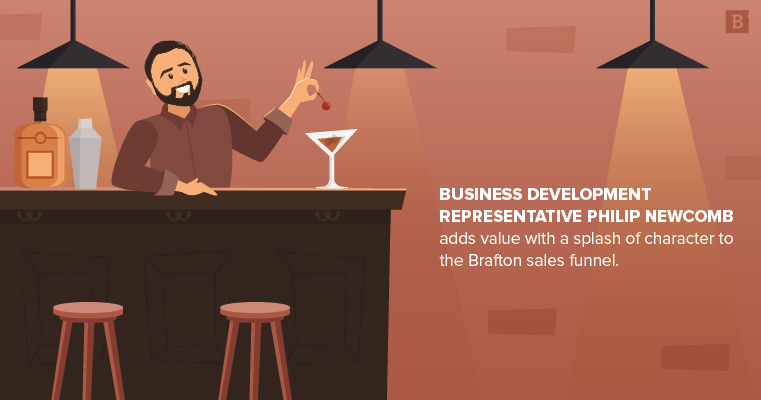“Keep it simple.”
This advice comes courtesy of Brafton’s own Philip Newcomb, and it applies equally well to two things he excels at: outbound marketing and making Manhattans.
Newcomb is a business development representative (BDR), meaning he’s responsible for warming leads before handing them over to a BDE to discuss a possible scope of work. On paper, the breakdown of his day looks something like this:
- 70 percent is spent on the phone conversing with leads about how Brafton can help them achieve their goals.
- 15 percent is dedicated to email outreach, usually with potential leads that have shown some interest in our online content.
- 10 percent is lost in a rabbithole of readings about all things content and digital marketing (including the Brafton blog).
- 10 percent is reserved for firming up demonstrations (making sure invites go out, that the BDEs have all the information they need before meeting with a lead, that everyone’s schedule is in alignment, etc.)
Yes, that is 105 percent. Because Newcomb always gives a little something extra (and we don’t just mean the dash of cherry juice or swipe of orange-peel he adds sparingly to his mixed drink of choice).
That extra something he adds to the sales funnel is simple but oh so appreciated by leads: value.

Making the most of a lead’s time
Newcomb drew a fascinating correlation between what I do as a writer (create content that’s hopefully useful to leads) and what he does as a BDR (conversing with leads about how Brafton can help them): We both strive for an even exchange of time and value. Leads give us time, and we give them something of value in return, whether that’s a complete list of the best free marketing tools, quick tips about how they can make their webpages stickier or a competitor scorecard.
This exchange, implicit in inbound marketing (and the point of content marketing), is moving outbound:
“Brafton has adapted an inbound marketing model where we try to provide value at every step of the buyer journey,” Newcomb said. “And we’re tying to apply that with our outbound calls.”
One of the reasons for this shift is that leads no longer have to be told that they need content marketing.
“99.9 percent of prospective clients I speak to are familiar with content marketing, appreciate it, see value in it and usually have an internal team, an external team and maybe even another partner to handle other aspects of content marketing such as the backend of SEO,” Newcomb said.
99.9 percent of prospective clients I speak to are familiar with content marketing, appreciate it, see value in it.
The Content Marketing Institute corroborates this claim, noting that only 1 percent of organizations are, “not at all committed” to content marketing.
This means Newcomb’s goal isn’t to sell the idea of content marketing, but rather, to start a conversation with a lead that demonstrates Brafton’s expertise and capabilities while making good use of that lead’s time. These discussions may be guided by previous engagements (download of a certain eBook) or simply limited to what Newcomb can gather about leads from looking at their website.
Either way, the calls need to be incisive to make the best use of everyone’s time; and Newcomb needs to be enthusiastic and tenacious, which is never a problem for him:
“I’m rather passionate about content marketing, digital marketing and what Brafton can accomplish.” Newcomb said. “When I get on the phone, I’m not someone that will really let you off easy.”
And even when leads lack the immediate need or budget for Brafton’s services, Newcomb says they have something to gain from a conversation.
“Just meeting with us, whether it’s to talk strategy or get competitor information or feedback in regards to your own site, can be beneficial,” Newcomb said.
Those benefits can take the form of:
- Competitor scorecards.
- Recommendations based on initial site assessments.
- Tips that could improve the status-quo strategy (for instance, it’s not unusual for Newcomb to coordinate with say, a social media strategist who can provide a few easy action items the lead can take by themselves).
And what does Brafton get in return? The lead’s time and attention, and hopefully, a mental placeholder for the when an occasion to work with us does arise.
‘LeBronze James’
Newcomb jibes well with the culture of openness at Brafton. He and his tight-knit crew of co-workers are at liberty to explore new and creative engagement methods that make their day more rewarding and the sales funnel generally more appealing to leads.
Newcomb’s naturally lighthearted, fun-loving demeanor is also an asset to his role. He slices through repetition and bouts of rejection with playful banter and silly anecdotes. Case in point: Newcomb’s penchant for spending time at the beach earned him the unofficial – and almost certainly self-bestowed – nickname of “LeBronze James.” Fitting for a stereotypically tan resident of Boston’s North Shore.
Which is where you’ll find Newcomb when he isn’t beautifying the sales funnel. Typically he’ll be spending time with his girlfriend, hosting family and friends at his home, swimming, hanging out by the pool and, of course, sipping on a Manhattan.
Which reminds me:
“Invest in good bitters,” Newcomb advised to Manhattan makers of the world. “They make all difference.”





